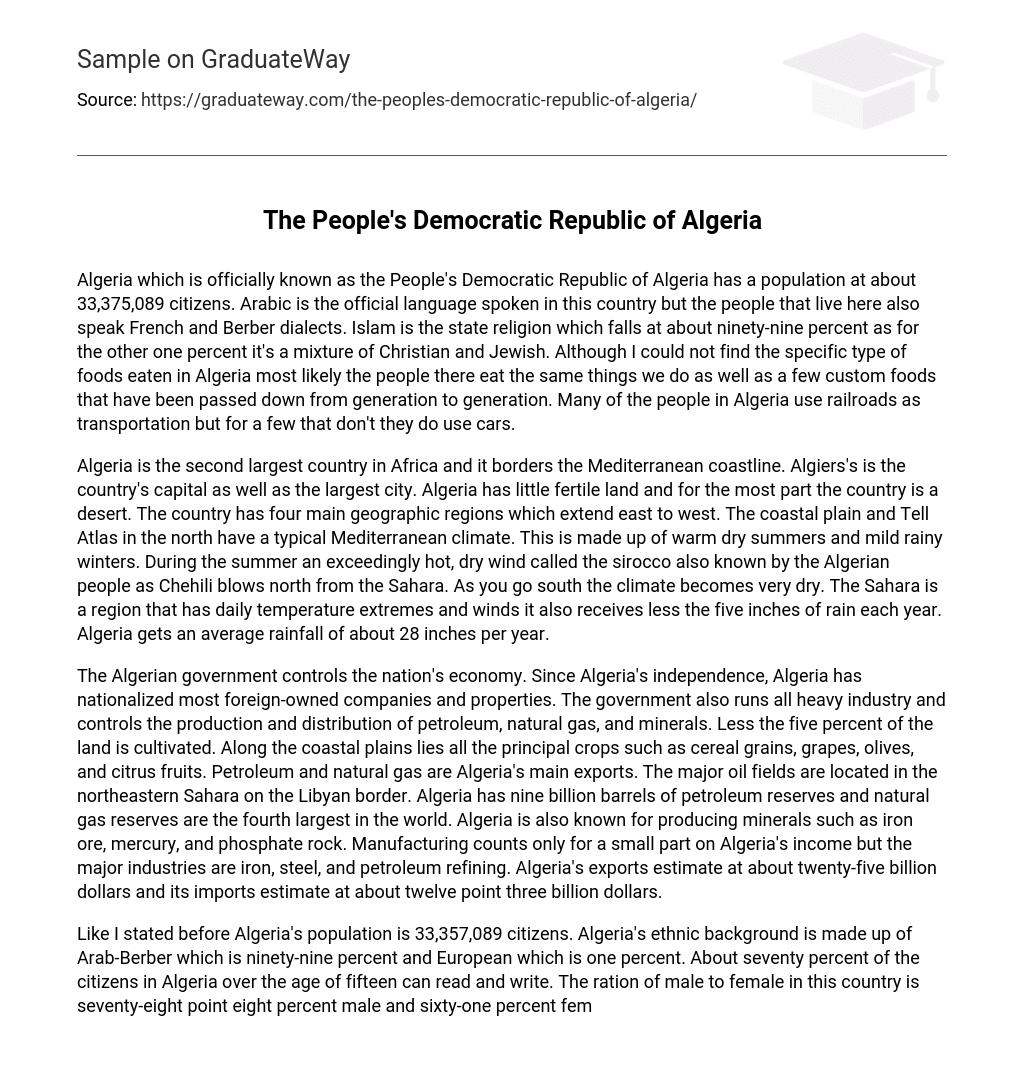Algeria, officially known as the People’s Democratic Republic of Algeria, has a population of about 33,375,089 individuals. The main language spoken in this country is Arabic; however, French and Berber dialects are also commonly used by residents. Islam serves as the state religion and is followed by around ninety-nine percent of the populace, while Christianity and Judaism are practiced by the remaining one percent. While specific details about Algerian cuisine were not available, it can be assumed that locals consume similar food to other regions alongside traditional dishes passed down through generations. Railways play a significant role in transportation for many Algerians, although cars are also used.
Algeria is the second largest country in Africa and shares its borders with the Mediterranean coastline. Algiers serves as both the capital and largest city of the country. Despite having little fertile land, Algeria is mostly covered by desert. It can be divided into four main geographic regions that span from east to west. The northern coastal plain and Tell Atlas experience a typical Mediterranean climate, with warm, dry summers and mild, rainy winters. During summer, Algerians recognize the scorching hot, dry wind known as the sirocco or Chehili blowing northward from the Sahara. As one moves southward, the climate becomes extremely dry. The Sahara region encounters daily temperature extremes, strong winds, and receives less than five inches of rainfall annually. On average, Algeria receives 28 inches of rainfall per year.
The Algerian government controls the national economy by nationalizing foreign-owned companies and properties, overseeing heavy industry, and managing the production and distribution of petroleum, natural gas, and minerals. Cultivation is mainly limited to coastal plains where crops like cereal grains, grapes, olives, and citrus fruits are grown. Algeria’s primary exports consist of petroleum and natural gas from major oil fields located in the northeastern Sahara on the Libyan border. The country holds significant reserves of these resources and ranks fourth globally for natural gas reserves. Additionally, Algeria is renowned for its mineral production such as iron ore, mercury, and phosphate rock. Manufacturing contributes a small portion to Algeria’s income with major industries including iron, steel, and petroleum refining. Estimated at around $25 billion, Algeria’s exports surpass its imports estimated at approximately $12.3 billion.
Algeria has a population of 33,357,089 people, with the majority being of Arab-Berber ethnicity. Europeans account for one percent of the population. Over 70% of Algerians above the age of fifteen are literate. In terms of gender distribution, males represent 78.8%, while females make up 61%. Algeria’s infant mortality rate is 37.74 deaths per 1,000 live births and the average life expectancy is 69.14 years for males and 72.01 years for females.
The unemployment rate in Algeria is around thirty percent, with government employment at 32%, agriculture at 14%, construction or public works at 10%, trade at13.4%, and miscellaneous jobs at16% being the primary sectors of employment.
Algeria has a republican government and is divided into 48 provinces. To create political parties, approval from the Ministry of the Interior is necessary. Parties based on differences in religion, language, race, gender, or region are strictly prohibited. The President of Algeria serves as both head of state and head of government and can hold office for a maximum of two consecutive five-year terms. The Algerian parliament consists of two chambers that are influenced by French and Islamic law.
The flag of Algeria features two vertical bands: green and white. In the center, there is a red crescent moon and star representing Islam. Revolution Day, celebrated on November 1st, 1954, is recognized as Algeria’s national holiday.
In Algeria, the death penalty is still enforced for criminal offenses. The specific execution methods used are uncertain but could include electrocution or beheading, among others. The severity of crimes that lead to the death penalty is not specified.





